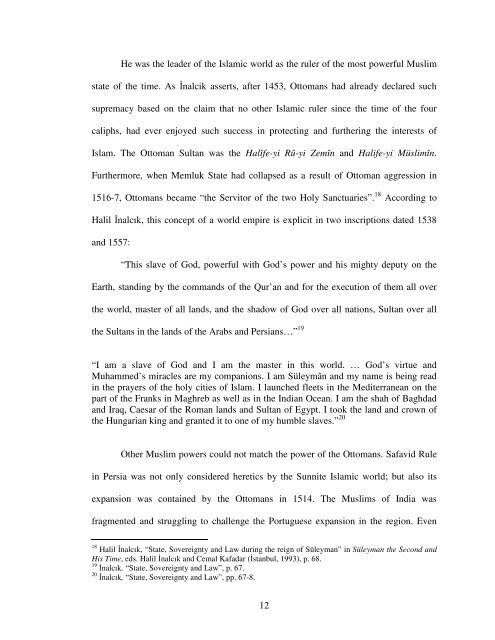OTTOMAN CORSAIRS IN THE WESTERN ... - Bilkent University
OTTOMAN CORSAIRS IN THE WESTERN ... - Bilkent University
OTTOMAN CORSAIRS IN THE WESTERN ... - Bilkent University
Create successful ePaper yourself
Turn your PDF publications into a flip-book with our unique Google optimized e-Paper software.
He was the leader of the Islamic world as the ruler of the most powerful Muslim<br />
state of the time. As İnalcik asserts, after 1453, Ottomans had already declared such<br />
supremacy based on the claim that no other Islamic ruler since the time of the four<br />
caliphs, had ever enjoyed such success in protecting and furthering the interests of<br />
Islam. The Ottoman Sultan was the Halîfe-yi Rû-yi Zemîn and Halife-yi Müslimîn.<br />
Furthermore, when Memluk State had collapsed as a result of Ottoman aggression in<br />
1516-7, Ottomans became “the Servitor of the two Holy Sanctuaries”. 18 According to<br />
Halil İnalcık, this concept of a world empire is explicit in two inscriptions dated 1538<br />
and 1557:<br />
“This slave of God, powerful with God’s power and his mighty deputy on the<br />
Earth, standing by the commands of the Qur’an and for the execution of them all over<br />
the world, master of all lands, and the shadow of God over all nations, Sultan over all<br />
the Sultans in the lands of the Arabs and Persians…” 19<br />
“I am a slave of God and I am the master in this world. … God’s virtue and<br />
Muhammed’s miracles are my companions. I am Süleymân and my name is being read<br />
in the prayers of the holy cities of Islam. I launched fleets in the Mediterranean on the<br />
part of the Franks in Maghreb as well as in the Indian Ocean. I am the shah of Baghdad<br />
and Iraq, Caesar of the Roman lands and Sultan of Egypt. I took the land and crown of<br />
the Hungarian king and granted it to one of my humble slaves.” 20<br />
Other Muslim powers could not match the power of the Ottomans. Safavid Rule<br />
in Persia was not only considered heretics by the Sunnite Islamic world; but also its<br />
expansion was contained by the Ottomans in 1514. The Muslims of India was<br />
fragmented and struggling to challenge the Portuguese expansion in the region. Even<br />
18 Halil İnalcık, “State, Sovereignty and Law during the reign of Süleyman” in Süleyman the Second and<br />
His Time, eds. Halil İnalcık and Cemal Kafadar (İstanbul, 1993), p. 68.<br />
19 İnalcık, “State, Sovereignty and Law”, p. 67.<br />
20 İnalcık, “State, Sovereignty and Law”, pp. 67-8.<br />
12

















